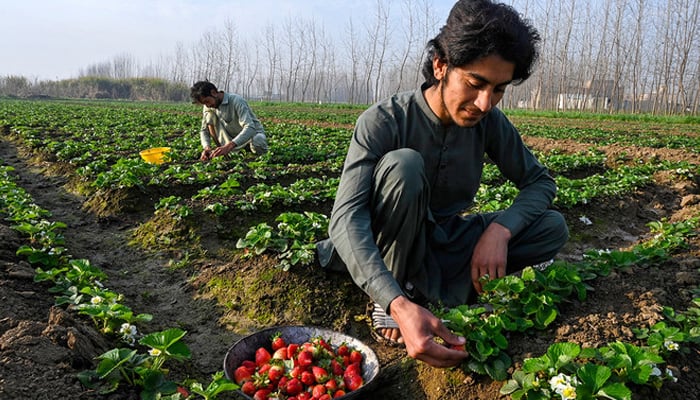Expert calls for technological advancements in agri sector
PESHAWAR: Agriculture expert and former secretary of the Pakistan Tobacco Board (PTB), Khan Faraz, has stated that there is a need for biotechnology and genomics, digital agriculture, smart water management, and organic and regenerative agriculture to enhance agricultural production in the country.
“Pakistan is an agricultural country, and agriculture is the mainstay of the country’s economy. While its direct contribution is approximately 23 percent, its indirect contributions are upwards of 45 percent,” he said.
He said that the agriculture sector must move towards sustainability and nature positivity, adding that Pakistan should strike a balance between economic compulsions and ecological limitations.
Khan Faraz mentioned that Pakistan’s wheat production stands at 3.35 million tons. “The advent of Field Marshal Ayub Khan’s Green Revolution marked a transformative era. By 1982, our wheat output quadrupled, reaching an impressive 12 million tons. Similarly, in 1960, rice production amounted to 2.24 million tons. With the introduction of Field Marshal Ayub Khan’s ‘Green Revolution,’ our rice production experienced a remarkable surge. By 1982, it had increased by 140%, reaching a substantial 5.37 million tons,” recalled the former PTB secretary. He identified four key drivers behind Field Marshal Ayub Khan’s Green Revolution: high-yielding varieties, fertilisers, pesticides, and irrigation.
“It is worth mentioning that high-yielding varieties produced more grains per plant, and the use of fertilisers significantly boosted the growth and productivity of wheat and rice crops. Chemical pesticides were introduced, and effective control of pests and diseases contributed to the overall increase in wheat and rice production,” opined Khan Faraz.
-
 ‘Disgraced’ Andrew Still Has Power To Shake King Charles’ Reign: Expert
‘Disgraced’ Andrew Still Has Power To Shake King Charles’ Reign: Expert -
 Why Prince William Ground Breaking Saudi Tour Is Important
Why Prince William Ground Breaking Saudi Tour Is Important -
 AOC Blasts Jake Paul Over Bad Bunny Slight: 'He Makes You Look Small'
AOC Blasts Jake Paul Over Bad Bunny Slight: 'He Makes You Look Small' -
 At Least 53 Dead After Migrant Boat Capsizes Off Libya
At Least 53 Dead After Migrant Boat Capsizes Off Libya -
 'God Of War' Announces Casting Major Key Role In Prime Video Show
'God Of War' Announces Casting Major Key Role In Prime Video Show -
 Real Reason Prince William, Kate Broke Silence On Andrew Scandal Revealed
Real Reason Prince William, Kate Broke Silence On Andrew Scandal Revealed -
 Drew Barrymore Responds To 'Charlie's Angels' Costar's Comments About Her
Drew Barrymore Responds To 'Charlie's Angels' Costar's Comments About Her -
 Shakira Slips Hard On Stage During Life Show
Shakira Slips Hard On Stage During Life Show -
 King Charles Speaks Out Over Andrew's Scandal: 'Stand Ready To Help Police'
King Charles Speaks Out Over Andrew's Scandal: 'Stand Ready To Help Police' -
 Dax Shepard Recalls Horrifying Accident That Almost Killed Him
Dax Shepard Recalls Horrifying Accident That Almost Killed Him -
 Logan Paul's Bodyguard Hits Fan On Super Bowl Day
Logan Paul's Bodyguard Hits Fan On Super Bowl Day -
 Epstein Files: Anne Hathaway Mentioned As Highly Desired Guest For Bill Gates?
Epstein Files: Anne Hathaway Mentioned As Highly Desired Guest For Bill Gates? -
 Prince Harry Under A Lot Of Stress As Meghan Markle Makes Bizarre Demands
Prince Harry Under A Lot Of Stress As Meghan Markle Makes Bizarre Demands -
 Princess Beatrice, Eugenie's Subtle Break From Disgraced Parents Exposed
Princess Beatrice, Eugenie's Subtle Break From Disgraced Parents Exposed -
 Baby Left In Running Bathtub Dies After Father ‘forgets’ Him
Baby Left In Running Bathtub Dies After Father ‘forgets’ Him -
 King Charles Takes A Major Step To Keep Horrified Prince William Out Of The Loop On Andrew: Insider
King Charles Takes A Major Step To Keep Horrified Prince William Out Of The Loop On Andrew: Insider




